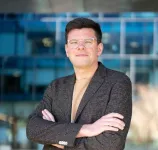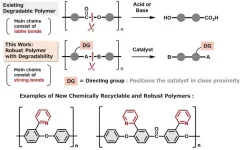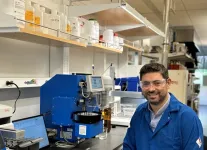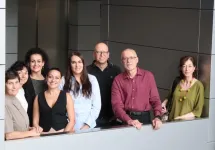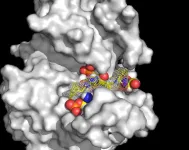(Press-News.org) The winner of one of the UK’s biggest academic prizes has discovered what he believes is the key to long-term innovation and economic growth: unplanned intellectual friendships – like Greek philosophers Plato and Aristotle, or DNA pioneers James Watson and Francis Crick.
Professor Kirk Doran, an Associate Professor of Economics at the University of Notre Dame in Indiana in the United States, has been researching what drives innovation for 14 years – and has made his discovery by forensically analysing data including published research and census, tax, migration and historical data.
Professor Doran has been announced today as the winner of the $75,000 Panmure House Prize, which seeks out ‘radical innovation’ and celebrates Adam Smith, the 18th century Scots economist and philosopher who is known as the father of modern economics.
“Unexpected intellectual collaborations and friendships that you didn't plan in advance lead to the greatest explosions of new knowledge generation and innovation,” Professor Doran explains. “It’s when innovative people bump into each other randomly and then start hanging out with each other all the time – and talking about dozens of different topics – that they can stumble across something stellar. Friendship is then the key bonding factor in deep collaborations over many years that can overcome immense challenges to produce groundbreaking new discoveries, breakthroughs and inventions.”
These explosions of new knowledge drive economic growth and often come from intellectual friendships between experts in different disciplines, Professor Doran explains. Inter-disciplinary thinking was a key hallmark of the work of Adam Smith, who was a central figure of the Scottish Enlightenment in the second half of the 18th century. Coffee house gatherings and debates played a central role in the era’s outpouring of intellectual and scientific accomplishments.
“The Scottish Enlightenment shows brilliantly how a melting pot of minds can lead to huge innovations in science, culture and society,” Professor Doran says.
“Unexpected friendships during this time that led to breakthroughs include Adam Smith and Scottish philosopher and historian David Hume. They both used experience and observation rather than reason to understand causes and effects in the world – an approach known as empiricism. And this laid the foundation of modern economic thinking – particularly that free trade and markets can benefit all of society, not just a privileged few.”
Other historic friendships that have led to innovative breakthroughs include ancient Greek philosophers Plato and his student Aristotle, whose ideas and teachings in philosophy still shape our understanding of the world today. English 16th century lawyer and scholar Thomas More and his friend Desiderius Erasmus, a Dutch priest, together progressed humanism, which uses science and evidence to understand the world rather than religion.
German mathematicians and friends David Hilbert and Hermann Minkowski were pioneers in applying mathematics to physics and influenced German physicist Albert Einstein. Other pioneering friendships include American biologist James Watson and Francis Crick, an English physicist, who together discovered the structure of DNA in 1953.
Professor Doran’s research includes analysing which pioneers knew each other, worked together, lived near each other or shared similar ideas. He has analysed data stretching as far back as the 1300s to the present day. To unlock the economic potential of these unplanned intellectual friendships, Professor Doran is calling on countries to encourage more collaboration between innovators in different disciplines.
“Policy makers must increase incentives for collaboration across disciplines,” he says. “If institutions can better promote these collaborations, I believe the long-run impact can be enormous.”
Professor Doran will use the Panmure House Prize money to further his research, including better understanding which social structures and incentives create the type of teams where collaboration can lead to long-term innovation and economic growth.
He will also visit Edinburgh to collect his prize and take part in three days of activities at Panmure House. This will include recording a podcast, hosting a student workshop and presenting a public lecture.
Named after Panmure House, Adam Smith’s former Edinburgh home, the Panmure House Prize rewards groundbreaking research that contributes to advancing long-term thinking and innovation.
Professor Doran was one of four academics from the United States, Spain and Israel who were shortlisted for the prize, which attracted a record number of entries in 2024, its fourth year.
The Panmure House Prize is administered in partnership with FCLTGlobal, a non-profit organisation that promotes long-term investing, and supported by investment manager Baillie Gifford.
James Anderson, Managing Partner and Chief Investment Officer at investment management company Lingotto Innovation and Chair of the Panmure House Prize judging panel, said: “Pioneers who drive progress and new thinking are the engines behind economic growth – as Professor Doran’s research shows us. It’s critical to support these pioneers and we’re excited to be awarding our fourth Panmure House Prize to research that we really feel is groundbreaking. Adam Smith was himself a pioneer whose hallmark was collaboration across different disciplines – and Professor Doran’s work embodies this approach.”
John T. McGreevy, the Charles and Jill Fischer Provost of the University of Notre Dame, said: "We are delighted to see Kirk Doran's research receive this international recognition. The Panmure House Prize’s emphasis on long-term, interdisciplinary thinking mirrors the University of Notre Dame's commitment to scholarly innovation and excellence across the disciplines."
Entrants to the Panmure House Prize undergo a rigorous selection process, overseen by a distinguished panel of judges comprising leading scholars and practitioners in the field of economics, business and policy.
Each is evaluated based on their originality, scholarly rigour, potential impact, and relevance to contemporary economic and societal discourse.
The other shortlisted candidates for the 2024 Panmure House Prize were:
Michela Giorcelli, Associate Professor in the Department of Economics at the University of California, Los Angeles (UCLA).
Dr Moran Lazar, Senior Lecturer (Assistant Professor) at the Coller School of Management in Tel Aviv University in Israel.
Dr Ivanka Visnjic, Professor of Innovation at Esade Business School in Barcelona, Spain, where she leads the Operations, Innovation, and Data Sciences Department.
For more information about the Panmure House Prize, including submission guidelines and key dates, please visit the website.
About Panmure House
Panmure House was originally built in 1691 and was the home of Scottish Enlightenment economist Adam Smith from 1778 to his death in 1790. It is now part of Edinburgh Business School, the business school of Heriot-Watt University in Edinburgh.
Edinburgh Business School and Heriot-Watt University rescued Panmure House from dereliction in 2008 and invested £5.6 million over 10 years restoring it. Panmure House now hosts a year-round programme of events, debates, research projects and education focused on urgent economic, political and philosophical questions in the 21st century.
About Adam Smith
Born in Kirkcaldy, in Fife, Adam Smith was a Scottish economist and philosopher best known today as the father of modern economics. His most famous work, An Inquiry into the Nature and Causes of the Wealth of Nations, continues to be regarded as the foundation text for the study of the relationship between society, politics, commerce and prosperity. Smith was a central figure of the Scottish Enlightenment – the extraordinary flowering of intellectual and cultural achievement that contributed so much to the shaping of the modern world. He was also a teacher with a profound interest in education for all.
END
Unexpected intellectual friendships, like Plato and Aristotle, are the secret of long-term innovation, finds prize-winning US academic
2024-10-07
ELSE PRESS RELEASES FROM THIS DATE:
Aussies above 50 are living longer, while younger people are suffering
2024-10-07
Australians under 50 are experiencing stagnating life expectancy while older cohorts, especially men, are living longer, according to new research from The Australian National University (ANU).
The study examined longevity trends and patterns in six English-speaking countries (Australia, Canada, Ireland, New Zealand, the United Kingdom and the United States) and compared them with other high-income countries.
The results show striking similarities between English-speaking countries in terms of adverse health outcomes for young and middle-aged adults under fifty.
Lead author and ANU demographer, Dr Sergey Timonin, said the study ...
New polymer design breaks the tradeoff between toughness and recyclability
2024-10-07
Osaka, Japan – Plastics underpin much of modern life—areas like medicine, technology, and food safety would be unrecognizable without plastics and their useful properties. However, the toughness of plastics, which is often desirable, also makes them a dangerous pollutant and difficult to recycle. The solution to this serious and growing problem is making plastics easier to recycle.
In a study recently published in Chemical Science, researchers at Osaka University have found a way to make tough, high-performance polymers, the main component of plastics, that can be broken down easily and precisely into their component parts and ...
Tax, smoke-free legislation, and anti-smoking campaigns linked to smoking reduction
2024-10-07
Tobacco use remains a significant global health challenge, despite extensive control measures at both national and international levels. Smoking continues to be a leading cause of premature death, with exposure to tobacco—whether through active smoking or secondhand smoke—significantly increasing the risk of non-communicable diseases (NCDs) such as cardiovascular disease, cancer, chronic respiratory conditions, and diabetes. These NCDs account for nearly 75% of annual global deaths.
A wide range of strategies has been developed to combat smoking and promote public health, including taxation, mass media campaigns, health warnings on packaging, marketing ...
Targeting failure with new polymer technology to enhance sustainability
2024-10-07
Targeting failure with new polymer technology to enhance sustainability
Sustainability is a complex problem with many different players and influenced by policies, society, and technical perspective.
We are reminded every day in the media of the unnecessary amount of waste that we are generating with pervasive pictures of plastic garbage patches floating in the oceans or stranded on our beaches.
Scientists within ASU’s School of Molecular Sciences (SMS) and the Biodesign Institute’s Center ...
Stigma has a profound impact on health outcomes must be addressed
2024-10-07
A new article published in Nature Reviews Disease Primers underscores the profound role that stigma can play in health care -- and how addressing stigma-related barriers can significantly improve health outcomes for individuals and communities around the world.
“Stigma has harmful effects on health, equity and justice,” says lead author Carmen Logie, a professor at the University of Toronto’s Factor-Inwentash Faculty of Social Work (FIFSW). "And while we need more rigorous evaluation of interventions ...
Has the affordable care act’s dependent coverage expansion benefited young adults diagnosed with cancer?
2024-10-07
The federal Patient Protection and Affordable Care Act (ACA) passed in 2010 includes a Dependent Coverage Expansion (DCE) provision that permits dependents to remain on their parents’ health insurance plans from age 19 to 25 years, the age group that has historically had the highest uninsured rate in the United States. A recent analysis reveals that during the ACA’s first decade, survival rates of DCE-eligible young adults with cancer have improved. The findings are published by Wiley online in CANCER, a peer-reviewed journal of the American Cancer Society.
To examine whether young adults with cancer diagnoses have ...
A new study reveals a key mechanism driving atherosclerosis in Hutchinson-Gilford Progeria Syndrome
2024-10-07
A team of researchers from the Centro Nacional de Investigaciones Cardiovasculares Carlos III (CNIC), the Centro de Investigaciones Biológicas Margarita Salas (CIB-CSIC), and the Instituto de Ciencias de Materiales de Madrid (ICMM-CSIC) has made a significant breakthrough in understanding the underlying causes of cardiovascular disease in patients with Hutchinson-Gilford progeria syndrome (HGPS), an ultra-rare genetic disorder that accelerates the aging process. The most serious consequence of HGPS is the early onset of cardiovascular disease, leading to premature death at an average age of 14.5 years.
The study was led by Dr. Vicente Andrés, ...
HPV vaccination switch to 1-dose gender-neutral approach
2024-10-07
Canadian vaccination programs could switch to a 1-dose gender-neutral human papillomavirus (HPV) vaccination approach and eliminate cervical cancer, suggests new modelling in CMAJ (Canadian Medical Association Journal) https://www.cmaj.ca/lookup/doi/10.1503/cmaj.240787.
“Our results have important policy implications in Canada, and in other similar high-income countries evaluating whether to switch to 1-dose HPV vaccination,” writes Dr. Marc Brisson, a full professor at Laval University, Québec, and director of the Mathematical Modeling and Health Economics of Infectious Diseases Lab at the ...
Scurvy: Not just an 18th-century sailors’ disease
2024-10-07
Scurvy, or vitamin C deficiency, is not just an 18th-century seafarers’ disease, as a case study of a 65-year-old woman with mobility issues and social isolation shows. In an article published in CMAJ (Canadian Medical Association Journal) https://www.cmaj.ca/lookup/doi/10.1503/cmaj.240769, clinicians describe how scurvy should be considered in patients with abnormal bleeding and nonspecific symptoms.
The patient visited the emergency department at a downtown Toronto hospital for leg pain and weakness, skin lesions, and discoloration. She also had several chronic health ...
Scientists discover a secret to regulating our body clock, offering new approach to end jet lag
2024-10-07
Singapore, 7 October 2024—Scientists from Duke-NUS Medical School and the University of California, Santa Cruz, have discovered the secret to regulating our internal clock. They identified that this regulator sits right at the tail end of Casein Kinase 1 delta (CK1δ), a protein which acts as a pace setter for our internal biological clock or the natural 24-hour cycles that control sleep-wake patterns and other daily functions, known as circadian rhythm.
Published in the journal PNAS, their findings could ...



